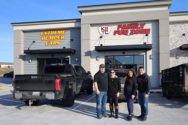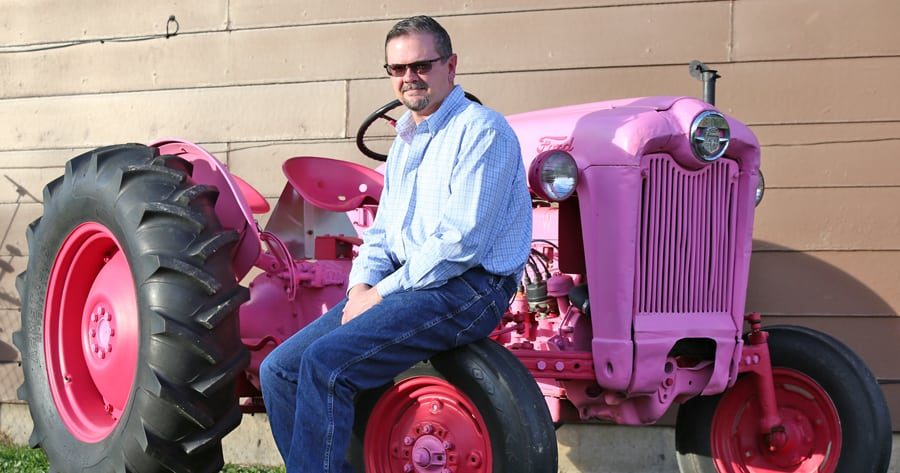
Home » Cancer forces Kennewick man to close his business, reassess future
Cancer forces Kennewick man to close his business, reassess future

December 15, 2016
By Sean Bassinger
David Nansel’s life took a turn for the worse last year.
The Kennewick man was diagnosed with cancer, lost his job and struggled with depression.
As he approaches the age of 50, he’s looking ahead to a future he never expected to have.
The former dairy industry veteran and software development consultant had to shut down his business because he lost the ability to stand for long periods of time, a side effect of the chemotherapy that likely saved his life.
As he emerges from a year of transitions and change, he landed a seasonal job with Amazon in Kennewick, which has given him a new lease on life and new hope.
“You’re only limited by yourself as far as what you want to do and what you can do,” he said.
Work after cancer
After closing his own dairy industry consulting business in December 2015, Nansel’s job search started shortly after his chemotherapy treatments for stage 2 Hodgkin’s lymphoma ended in March.
He didn’t have much luck at first as he didn’t have a college degree.
“That’s huge when you’re going to look for a job,” he said.
Born and raised in Western Washington, Nansel spent the majority of his early life working for family-owned dairy operations. His grandfather was a farmer in Nebraska, a tradition his family has since continued on several farms.
He graduated high school and joined the Army and when he got out, he went back to work in the dairy industry.
His cancer treatment regimen left him struggling with blood clots in his legs, which affected his ability to stand for long periods of time and caused partial vision loss.
“I just couldn’t do what I did in the dairy industry anymore being on my feet 12 hours a day,” he said, explaining why he had to close the business.
Changing how prospective job seekers view their work history can aid in the job search, experts say.
People believe they’re only qualified to do one job or set of jobs, but several commong skills are needed in more jobs than most may think, said Bill Watson of WorkSource Columbia Basin.
“What we really do counsel people on is taking account of their transferrable skills,” Watson said.
It’s easier for employers to teach new workers the technical aspects of the job. Finding those experienced with softer skills, such as interpersonal communication, customer service and punctuality, can be difficult, Watson said.
Nansel’s own 16 years of customer service experience in the dairy industry fit into what he needed for a seasonal job at Amazon.
Companies like Amazon, Dollar Tree, Target and Lowe’s frequently seek out seasonal workers in the Tri-Cities.
At least 300 job seekers and 38 employers attended a WorkSource career fair event in October.
Nansel started training several weeks ago and expressed interest in staying with the company. He said he loves working with customers and doing whatever he can to make them happy.
“That’s easy for me,” he said. “That’s second-hand.”
And when he’s not working, he continues to share his own cancer experience with the community.
“David is far from done. He’ll rise to the next opportunity and challenge with the same grace and spirit that he handled cancer and the demise of his business. I think his journey is an inspiration to others who may be hanging on to businesses or career dreams while facing cancer or another serious illness. All is not lost…it’s in the attitude. Nowadays more people successfully battle what would have been a terminal diagnosis only decades ago,” said Lisa Teske, director of marketing and business development for Trios Health.
Spreading awareness
Though now separated, Nansel and his wife, a breast cancer survivor, worked to get the word out about breast cancer awareness and prevention.
One idea Nansel had was less conventional than most — it involved an antique tractor.
“I’ve had a fondness of antique tractors since (rebuilding them in high school),” he said. “I have the mechanical ability and I love tinkering with stuff.”
Now referred to as his “survivor tractor,” Nansel found the antique Ford tractor in an old barn about six years ago. He bought it for $300 and planned to put about $400 to $500 into repairs so he could use it on his five-acre property in Snohomish.
After discovering he had to take it apart and rebuild it, he decided to paint it bright pink for breast cancer awareness. He dubbed it the Pink Pearl.
“My intent then and still today is to turn heads and have people ask why so I can raise awareness,” he said.
Nansel’s last chemotherapy treatment was on his birthday in March. After his infusion, he bundled up and drove his bright pink antique Ford tractor four miles across Kennewick to show his oncology staff. As he put it, he celebrated his way.
Since then he’s brought the tractor to the Making Strides Against Breast Cancer event at Columbia Park and Rising Above Cancer walk up Badger Mountain in Richland.
He plans to add several multi-colored ribbons to the Pink Pearl to represent different types of cancer.
New outlook on life
Nansel tries to look at the bright side as much as he can.
He said he’s realized life is too short to be indirect with himself and those around him. If something’s on his mind, he’ll say it. If he wants to do something, he’ll push for it.
Nansel said he will continue to try to be a positive influence for others as he looks after his 15-year-old son, attends more community events for cancer awareness and begins planning for retirement.
“I can change the future,” Nansel said. “I can’t change the past.”
So he’s looking forward.
“I’ve felt more alive now than what I’ve felt my entire life,” he said.
Local News
KEYWORDS december 2016





